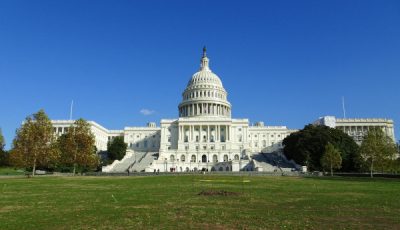Biden Pushes FCC To Reinstate Net Neutrality
 WASHINGTON — President Joe Biden has issued a new executive order meant to encourage greater competition in several industries across the country. While the order takes an anti-trust stance against large telecommunications firms, it also asks the Federal Communications Commission to reinstate net neutrality rules that were overturned by the Commission while under the control of the Republicans and the Trump administration two years ago. The President has yet to nominate a new Democrat to break the current 2-2 deadlock between the FCC’s Republican and Democrat commissioners however, so future rulemaking by the Commission may be slowed by the partisan divide.
WASHINGTON — President Joe Biden has issued a new executive order meant to encourage greater competition in several industries across the country. While the order takes an anti-trust stance against large telecommunications firms, it also asks the Federal Communications Commission to reinstate net neutrality rules that were overturned by the Commission while under the control of the Republicans and the Trump administration two years ago. The President has yet to nominate a new Democrat to break the current 2-2 deadlock between the FCC’s Republican and Democrat commissioners however, so future rulemaking by the Commission may be slowed by the partisan divide.
“The order tackles four issues that limit competition, raise prices, and reduce choices for internet service,” states the broadband section of a fact sheet about the executive order published by the Biden White House. The four issues that the president wants the FCC to address include deals between internet service providers (ISPs) and landlords; misleading advertising about prices for service; exorbitant termination fees; and net neutrality.
Implemented in 2015 during the Obama administration, the net neutrality rules prevented ISPs from throttling internet speeds at their own discretion. This ensured a standard of minimum internet speeds available to all broadband customers in the United States. Unfortunately, after the major telecoms and ISPs managed to convince former President Donald Trump and former FCC chair Ajit Pai through concerted lobbying efforts, net neutrality was repealed as a part of a wider regulatory reform platform backed by Trump. Before the end of the tenure of the previous administration, the FCC again voted to affirm its repeal on net neutrality.
Since then, there has been a vast outcry against the repeal of the old net neutrality rules. Major companies such as Microsoft and Twitter have announced support for the net neutrality rules in the past, arguing that the removal of the rules gives ISPs extreme amounts of power in limiting access to acceptable internet speeds. The impacts of the repeal have been documented widely, including an instance where Verizon was caught throttling the unlimited data of a California fire department responding to the catastrophic wildfires that ravaged the state during the 2018 season. Other cases abound, including instances of rural communities losing effective speeds for broadband, censoring content, and blocking access to products owned by competitors.
Despite that, adult platforms have always supported net neutrality regulations because of the potential for content bias held by ISPs. The Free Speech Coalition (FSC), the adult industry trade group, has long maintained the position that without net neutrality, ISPs will discriminate against adult websites by throttling speeds and limiting access by the potential levy of fees for exceeding the ISP guidelines for broadband use or navigating towards digital properties considered controversial or against the corporate culture of the internet provider.
“Cable providers could be able to limit or slow speeds of adult sites, either through the levy of fees or outright discrimination due to content,” the FSC wrote in a previous call to action. “Imagine going to your favorite site and having it load at a half-the-speed it currently does. Or if you own a site, or start a new site, having it load much slower than a larger competitor’s site. The repeal of Net Neutrality regulations not only gives ISPs the ability to discriminate against us, it places major constraints on innovations, as start-ups are placed at a competitive disadvantage.”
California’s state legislature implemented net neutrality mandates prior, and federal and state courts ruled in favor of the state to maintain the mandates after the ISP industry sued. Yet, the rest of the country is stuck waiting for the FCC to receive a new Democratic commissioner and to approve regulations that bring back the suite of net neutrality rules that balance out the internet and maintain accountability to firms willing to discriminate against entire industries like adult.

















